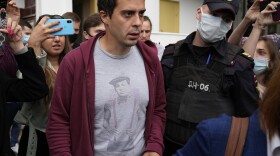STEVE INSKEEP, HOST:
During his press conference yesterday, President Trump said, quote, "you can talk all you want about Russia." That was one of 57 times that someone did. Fifty-seven times, the word Russia appears in the transcript of his event, sometimes spoken by the president and sometimes by reporters asking questions. Well, let's hear what Russians are thinking of the new American president. For that, we go to Moscow and NPR's Lucian Kim.
Hi, Lucian.
LUCIAN KIM, BYLINE: Hi, Steve.
INSKEEP: How are Russians responding to all this attention?
KIM: Well, Steve, you know, it's funny because Trump has also been mentioned a lot in Russian media. In fact, the Interfax news agency went ahead and counted. They found more than 200,000 mentions of Trump in Russian news reports in the month of January, which was a lot more than Putin was mentioned.
There had been reports that the Kremlin told state media to back off a little bit. And you know, sure enough, this morning, there was no coverage on state TV of Trump's press conference. Of course, there might also be a practical reason for that because Trump might not be proving to be quite as pro-Russian as people expected. And well, recently we've been hearing quite a few harsh words about Russia coming out of the Cabinet.
INSKEEP: Yeah. And the English translations that we get back here in the United States suggest a different tone, with Kremlin officials suggesting that maybe President Trump is not going to be so good for Russia after all.
KIM: Well, I do think there is that creeping sense. What's interesting is that Trump himself, yesterday in the press conference, said something. He said, you know, what he calls fake news about his Russian connections will limit his ability to eventually make a deal with Russia. And what's really striking is that Russian analysts have been saying the same thing, sort of painting it as the long hand of the Obama administration or maybe the American deep state that's trying to limit Trump's policies.
INSKEEP: So what do we make of a number of Russian moves that have made news here recently? We've got a Russian warship traveling along the Eastern Seaboard; Russian warplanes reportedly buzzing an American ship in the Black Sea; Russian missiles being deployed, even though they're supposed to be banned. What's Russia doing here.
KIM: Well, I think we need to remember the concept of reciprocity. I mean, the Russians have their own logic. The Russian ship off the U.S. coast may be a response to the American ship in the Black Sea. And the cruise missiles may also be a response to the missile defense plans the U.S. has in Eastern Europe. Secretary of Defense James Mattis just said this week that the U.S. must negotiate from a position of strength. And Sergei Shoigu, the Russian defense minister, hit right back. And he said that's going to be futile.
But what I do think is significant is just yesterday, there was a first meeting in more than three years between the top military officers of Russia and the U.S. And I think both sides are really very conscious of the risks of an unintended accident, especially with the U.S. and Russia both active in Syria.
INSKEEP: Does Russia acknowledge that by deploying certain intermediate-range missiles in Europe, it's violating a treaty with the United States?
KIM: Well, we don't know the exact details. I mean, the Kremlin spokesman, Dmitry Peskov, said Russia is meeting all its commitments to all arms control agreements. I think - you know, generally, it's still just early days to see where this is all going.
Yesterday, Sergey Lavrov, the Russian foreign minister, had his first ever meeting with the U.S. secretary of state, Rex Tillerson. And today we have the Munich Security Conference kicking off in Germany. Vice President Mike Pence will be there as well as other high-ranking Cabinet officials. Sergey Lavrov will also be attending. And - you know, I was there in past years. This conference always takes place in an old luxury hotel in Munich. And, you know, this year, it really looks like Russia is far less isolated. So it remains to be seen what kind of meetings might come up in the corridors of that hotel.
INSKEEP: Lots of context to come. NPR's Lucian Kim in Moscow - thanks.
KIM: Thanks, Steve. Transcript provided by NPR, Copyright NPR.





